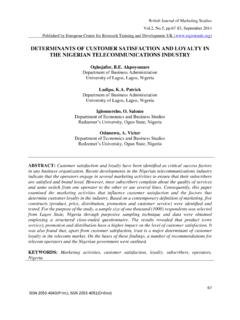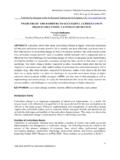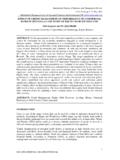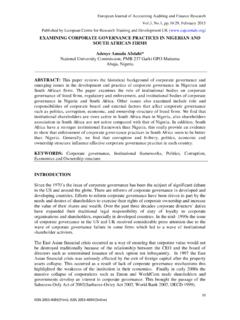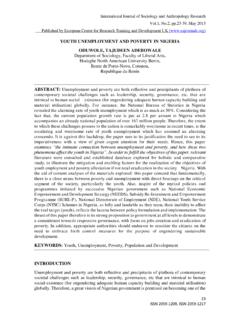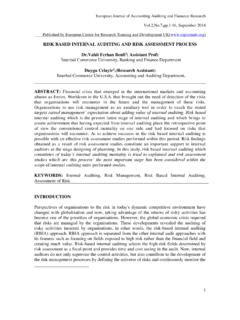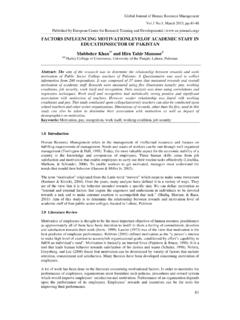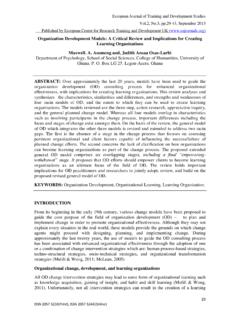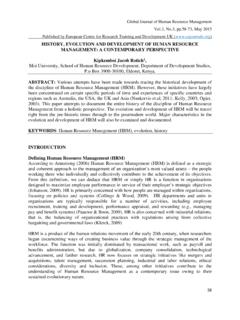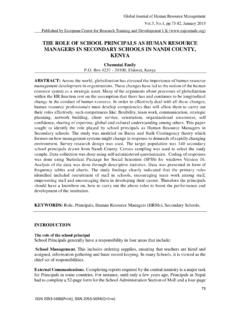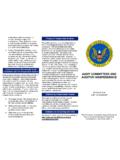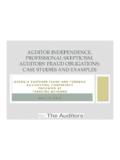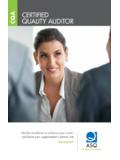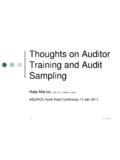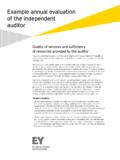Transcription of AUDITOR TENURE, AUDITOR INDEPENDENCE AND …
1 European Journal of Accounting Auditing and Finance Research , , April 2014 Published by European Centre for Research Training and Development UK ( ) 63 AUDITOR TENURE, AUDITOR INDEPENDENCE AND ACCRUAL BASED EARNINGS MANAGEMENT OF QUOTED COMPANIES IN NIGERIA Augustine O. Okolie; Ph. D, FCA Department of Accounting, Faculty of Management Sciences, Ambrose Alli University, Ekpoma, Nigeria Phone: +2348033750403; +2348056428335 ABSTRACT: AUDITOR Tenure defines the length of the AUDITOR -client relationship while AUDITOR INDEPENDENCE (measured by the quantum of audit fees received) defines an AUDITOR s quality of being free from influence, persuasion or bias, and hence the unbiased mental attitude in making decisions throughout the audit and financial reporting process. The absence of INDEPENDENCE may greatly impair the value of the audit service and the audit report. On the other hand, an excessively long association between the AUDITOR and his client may constitute a threat to INDEPENDENCE .
2 This study examines the relationship and effects of AUDITOR tenure and AUDITOR INDEPENDENCE on the earnings management (measured by the amount of discretionary accruals) of companies in Nigeria. The study relies on secondary data derived from various companies financial statements and the Nigerian Stock Exchange fact book to determine and measure the level of earnings manipulations in corporate financial statements, applying an all-inclusive multivariate analysis. The empirical analysis using a total of 342 company year observations, shows that Audit tenure and AUDITOR INDEPENDENCE exert significant effects and exhibit significant relationship with the amount of discretionary accruals of quoted companies in Nigeria. The descriptive statistics result reveals a minimal presence of discretionary accrual management by the companies in the sample and on the average; about 94% of the companies engage their audit firms for over three years, with a considerable experience of a substantial number of audit firms in this distribution.
3 KEYWORDS: AUDITOR Tenure, AUDITOR INDEPENDENCE , auditors Reports, Discretionary Accrual, Earnings Management, INTRODUCTION The auditing and the audit process provide an evaluation of the probability of material misstatements and reduce the possibility of undetected misstatement to a reasonable or appropriate assurance level (Watts & Zimmerman, 1986; Knechel, 2009). Consequently, auditing has been acknowledged to influence financial reporting and provide robust impact on investors confidence (Levitt, 1998). Essentially, external auditors typically perform significant and greatly challenging tasks in guaranteeing the credibility of financial reports (Mautz & Sharaf, 1961; Wallace, 1987). In view of the onerous challenges that face the audit function, some studies (Becker, Defond, Jiambalvo & Subramanyam, 1998; Bauwhede, Willekens & Gaeremynck, 2000; Heninger, 2001; Ebrahim, 2001; Piot & Janin, 2005; Gerayli, Yanesari & Ma atoofi, 2011) have attempted to ascertain any noticeable relationship between AUDITOR tenure, AUDITOR INDEPENDENCE and earnings management and have tried to European Journal of Accounting Auditing and Finance Research , , April 2014 Published by European Centre for Research Training and Development UK ( ) 64 demonstrate the impact of this relationship on the quality of the earnings reported by quoted companies in many countries.
4 The above studies show that the quality of audit is expected to minimize the extent of a firm s manipulations of reported income but majority of the results present a paradox of inconsistency and contradiction. The demand for audit of companies accounts is created by the agency problems which are related to the separation of corporate ownership from control (Eilifsen & Messier, 2000; Gerayli, Yanesari & Ma atoofi, 2011). The agency problem arises from the existence of asymmetric information in the principal agent contracts (Jenson & Messier, 2000). Some studies (Trueman & Titman, 1988; Dye, 1988; Schipper, 1989; Warfield, Wild & Wild, 1995) show that the existence of information asymmetry between corporate management and company shareholders greatly enhances the easy perpetration of earnings management practice. The audit of a company s accounts is a monitoring or control apparatus that minimizes information asymmetry and protects the interests of the principal.
5 Arrunada (2000) shows that the demand for auditing services arises from a need to facilitate dealings between the parties involved in business relationships shareholders, creditors, public authorities, employees, customers, etc. Exchanges between such parties are usually costly since information asymmetries give rise to uncertainty concerning the performance of contractual obligations. The presence of information asymmetry makes it difficult for shareholders to detect earnings management. According to IAASB (2011), variations in stakeholder perspectives of audit quality suggest that no single element should be assumed as having the dominant influence on audit quality explained in this study by AUDITOR tenure and AUDITOR INDEPENDENCE . This implies that a broader and deeper understanding of the complexities and nuances of the issue needs to be developed through studying the impacts of the two explanatory variables more holistically.
6 In consonance with the Response Divergent Stakeholders Theory (Freeman, 1999), it also implies that individual stakeholders should consider more carefully whether actions they endorse might have detrimental effects on others perspectives of audit quality. The auditors theory of inspired confidence also offers a linkage between the users requirement for credible financial reports and the capacity of the audit processes to meet those needs. Developed by the Limperg Institute in Netherlands in 1985, the theory of inspired confidence posits that the AUDITOR , as a confidential agent, derives his broad function from the need for expert and independent assessment plus the need for an expert and independent judgement supported by evidence. Minimizing the risk of undetected material misstatements implies that the accountant is under a duty to conduct his work in a manner that does not betray the confidence which he commands before the rational person even if the accountant may not produce what is greater than the expectation of the public (Limperg Institue, 1985).
7 The import of the theory of inspired confidence is that the duties of the auditors derive from the confidence that are bestowed by the public on the success of the audit process and the assurance which the opinion of the accountant conveys. Since this confidence determines the existence of the process, a betrayal of the confidence logically means a termination of the process or function. Carmichael (2004) discussed the social significance of the audit and asserted that when the confidence that society has in the effectiveness of the audit process and the audit report is misplaced, the value relevance of that audit is destroyed. Audit provides assurance to the owners, management, investors and European Journal of Accounting Auditing and Finance Research , , April 2014 Published by European Centre for Research Training and Development UK ( ) 65 stakeholders of a company as well as provides confidence in financial reporting, corporate governance and the capital markets.
8 The value of a company s shares has been shown to represent the value of its future earnings (Lev, 1989) and this explains why investors in a company have vital interest in the earnings reports. This study defines earnings management as a strategy used by company managers to deliberately manipulate company earnings to match a predetermined target and involves the planning and execution of certain activities that manipulate or smooth income, achieve high earnings level and sway the company s stock price (Schipper, 1989; Healy & Wahlen, 1999). Earnings management is primarily achieved by managed actions that make it easier to achieve desired earnings levels through accounting choices in Generally Accepted Accounting Principles (GAAP) commonly described as Discretionary Accruals Management (DAM). Earnings management is also achieved by the manipulation of the operating activities of a company (Cash Based or Real Earnings Management).
9 This study assumes that earnings management in an emerging market like the Nigerian Stock Exchange (NSE) is likely to present some problems for a true and qualitative earnings report. Anecdotal as well as empirical evidences on the effects of AUDITOR tenure and AUDITOR INDEPENDENCE on earnings management of non-financial institutions may exist in the developed countries (DeAngelo, 1986; Defond & Jiambalvo, 1994, Beaseley, 1996, McMullen, 1996; Dechow, Sloan & Sweeney, 1995; Abbott, Parker & Peter, 2000; Becker et al, 1998, Bauwhede, Willekens & Gaeremynck, 2000). Such evidence on the relationship between AUDITOR tenure, AUDITOR INDEPENDENCE and earnings management in emerging countries is scanty. In the case of Nigeria, it is not certain whether there is any existing study relating to the effects and association between AUDITOR tenure, AUDITOR INDEPENDENCE and earnings management of quoted companies in the non financial institutions as at the time of this study.
10 Problem Analyses The recent corporate accounting scandals has cast doubt on the quality of reported earnings and the ability of audit process to effectively constrain earnings management of companies across the world and Nigeria in particular (Badawi, 2008; Enofe, 2010). Differences in quality of the audit process and auditors reports result in variations in the credibility of auditors and the reliability of the earnings reports of companies. These recent corporate financial failures pose a great challenge to the authenticity, integrity, effectiveness and significance of the audit function. Badawi (2008) reports a list of companies involved in cases of accounting scandals related to poor audit quality and earnings manipulations in the past decade. In Nigeria, corporate scandals include the cases of Cadbury Nigeria Plc and African Petroleum (AP) (Okolie & Agboma 2008); Savannah Bank and African International Bank (Odia, 2007); Wema Bank, Nampak, Finbank and Spring Bank (Adeyemi & Fagbemi, 2010); and more recently Intercontinental Bank Plc.
